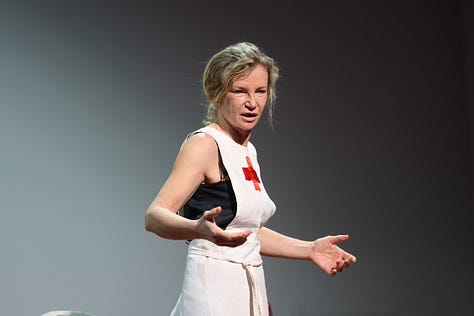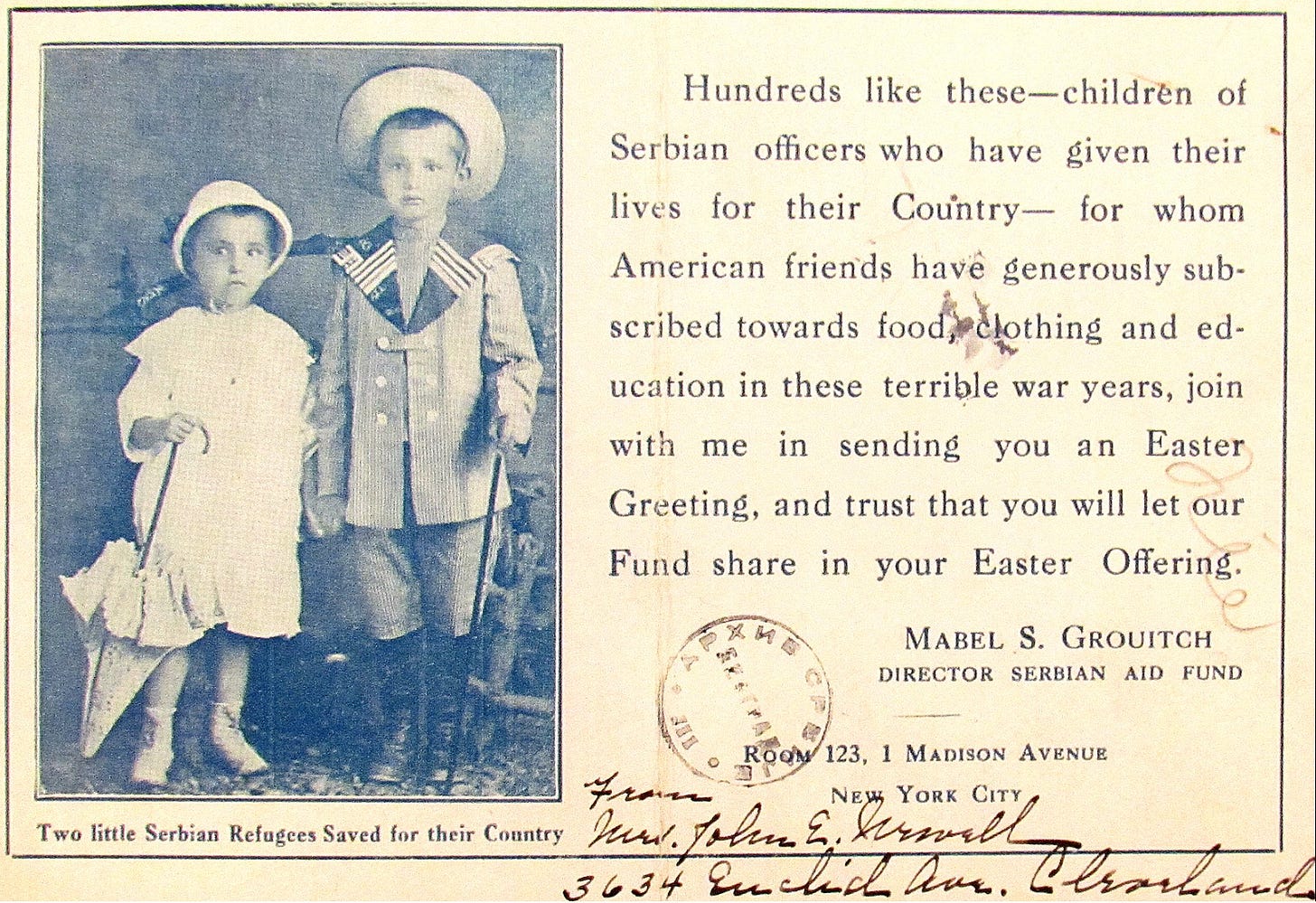The Story of Flora Sandes.
A British woman who served as a member of the Royal Serbian Army in World War One.
If you’ve read, or listened to or watched, the many posts, podcasts or videos I have published, over the past decades, about my life here in the western Balkans, you might have the impression that there’s not much in the way of negativity that I have experienced. To be honest thats true to an extent.
But occasionally, very occasionally, I do get the “you English, you hate us” comments, especially from Serbs. Maybe todays British foreign policy aims for this region are “meddling” in a way, but historically Britain, and especially Serbia, have been extremely friendly.
It seems to me, that the people I now live amongst, regardless of ethnicity, always, but always, refer back to historic events, to explain why things happen now, in the moment.
When I mention the positive relationship between my country of birth and theirs, in the past, I often get surprise or astonishment.
So in this post I’d like to offer just one example of British Serbian friendship, from the period of World War One, that while horrific on the “Western Front” was even more devastating here in the Balkans.
Just maybe, it can provide some context to those who actually know very little about the actuality back then.
This post then, looks at the fascinating life of Flora Sandes, an intrepid Englishwoman who defied societal norms and left an indelible mark on history.
The Story of Flora Sandes
Flora Sandes was born on January 22, 1876, in Nether Poppleton, Yorkshire, England.
She was the youngest daughter of an Irish family, and when she was nine years old, the family moved to Marlesford, Suffolk, then later to Thornton Heath, near Croydon, Surrey.
As a child she was educated by governesses.
Her upbringing was quintessentially Victorian, but her spirit was anything but conventional.
As a young girl, Flora exhibited a tomboyish nature, revelling in activities typically reserved for boys. She rode horses, practiced shooting, and harboured a secret wish to have been born a boy herself.
She learned to drive, and drove an old French racing car.
She took a job as a secretary.
⬆️ The Ballad of Fora Sandes - Reg Meuross ⬆️
Flora’s adventurous spirit led her to join the First Aid Nursing Yeomanry (FANY), an all-women mounted paramilitary organisation formed in 1907 . There, she acquired skills in first aid, horsemanship, signalling, and drill.
She left the FANY in 1910, joining Mabel St Clair Stobart, in the formation of the Women's Sick and Wounded Convoy Corps. The Convoy saw service in Serbia and Bulgaria in 1912 during the First Balkan War. At the outbreak of the First World War in 1914, she volunteered to become a nurse, but was rejected due to a lack of qualifications.

Sandes nonetheless joined a St John Ambulance unit raised by American nurse Mabel Grouitch, and on 12 August 1914 left England for Serbia with a group of 36 women to try to aid the humanitarian crises there.
Flora arrived in Kragujevac, the base for Serbian forces fighting against the Austro-Hungarian offensive. Flora joined the Serbian Red Cross and worked in an ambulance for the Serbian Army's 2nd Infantry Regiment.
In 1914 she went riding with a Serbian soldier who, impressed with her equestrian skills, told her she was wasted as a nurse and should enlist as a soldier; she told Dr Isabel Emslie, "I've always wished to be a soldier and to fight.
Her dedication and equestrian skills caught the attention of a Serbian soldier who encouraged her to enlist as a soldier. Flora’s lifelong dream of being a warrior was about to come true.
In 1915 Flora struggled persistently to get to the front, eventually joining the ambulance of the Second Regiment at the Babuna Pass.
During the Great Retreat through Albania, all the other ambulance staff fled or were killed.
Flora could no longer make herself useful as a nurse and was enrolled as a private by General Miloš Vasić. She quickly advanced to the rank of corporal. She recounted later that to formalise the change she removed her Red Cross badge and replaced it with the brass regimental figures from her commanding officer, Colonel Milić’s epaulettes.
In 1916, during the Serbian advance on Bitola (Monastir), Flora was seriously wounded by a grenade in hand to hand combat. She subsequently received the highest decoration of the Serbian Military, the Order of the Karađorđe's Star.
At the same time, she was promoted to the rank of sergeant major.
Also in 1916, Sandes published her autobiography, An English Woman-Sergeant in the Serbian Army, based on her letters and diaries. She used this account to help her raise funds for the Serbian Army.
With Evelina Haverfield, Flora founded the Hon. Evelina Haverfield's and Sgt-Major Flora Sandes' Fund for Promoting Comforts for Serbian Soldiers and Prisoners.
Unable to continue fighting due to her injury, she spent the remainder of the war running a hospital.
In June 1919, a special Act of Parliament was passed in Serbia that made her the Serbian Army's first female commissioned officer.
She was finally demobilised in October 1922.
Flora’s presence on the frontlines challenged gender norms and inspired those around her.
In May 1927, Flora married Yuri Yudenitch, a former Russian White Army officer.
The couple lived for a time in France, but afterwards returned to Serbia (which had become part of the Kingdom of Yugoslavia), and settled in Belgrade. Among other jobs, Sandes drove Belgrade's first taxicab. Also in 1927, she published a second autobiography. She lectured extensively on her wartime experiences in the United Kingdom, Australia, New Zealand, France, Canada and the United States. She wore her military uniform while delivering her lectures.
When, during the Second World War, Germany launched its attack on Yugoslavia in April 1941, Sandes and Yudenitch were recalled to military service, but the invasion was over before they could take up any military duties.
They were briefly interned by the Germans, before being released on parole.
Yudenitch fell ill, was removed to hospital, and died there in September 1941.
Flora returned to England, spending the last years of her life in Suffolk, living at Lower Hacheston near Wickham Market.
She died at the East Suffolk and Ipswich Hospital on 24 November 1956.
In St Andrew's Church in Marlesford, a memorial plaque on the south wall in the choir stalls is dedicated to her.
Flora Sandes remains an enduring symbol of determination, resilience, and a rebellious spirit. Her story transcends time, reminding us that courage knows no gender. Flora, the British warrior who fought alongside Serbian comrades, continues to inspire generations.
The Legacy of the British Heroines in Serbia during the First World War
The Serbian Mail issued these commemorative stamps in December 2015. The stamps tell the story of the British women who arrived to Serbia to assist the wounded and sick in war. They came individually or as part of organisations which were set up in Britain at the beginning of the war. Stamps showing Flora Sandes (left) and Katherine MacPhail (right). MacPhail (1897-1974) worked at the Military Hospital in Belgrade during the First World War. After the war she remained in Serbia where she founded the country’s first children’s hospital in 1921.
Books about Flora Sandes ⬇️
Alan Burgess, The lovely sergeant: the life of Flora Sandes. (London, 1965). X.639/721
Louise Miller, A fine brother: the life of Captain Flora Sandes (Richmond, 2012) YC.2013.a.2462
Flora Sandes, An English woman-sergeant in the Serbian Army (London, 1916) 09082.aa.25. (Serbian translation by Spiro Radojčić, Engleskinja u srpskoj vojsci Flora Sandes (New York, 1995). YF.2005.a.27142).
A Loose Family Connection

Keeping the memory of Flora Sandes alive in the Balkans
I recently enjoyed a brilliant evening in Banja Luka, watching the amazing Tatjana Kecman, tell the story of Flora Sandes, the English woman who joined the Serbian army in World War One.
The performance was a “mondrama”, a type of one-person show, that narrated Flora’s life.
The audience was immersed in Flora's story, as she spoke directly to them as if they were her confidants.
The performance was written and directed by Tatjana, and the sound design enhanced the mood and emotion of the scenes, creating a powerful impact on the audience.
I actually found out about this from my wife, Tamara, who had found about the monodrama from an online post.
Images from the performance ⬇️ are courtesy of Darko Četković.








Please also do share this post it really helps us to grow awareness for Bosnia and Herzegovina.
We have a short survey designed to help us improve our Substack. It would be super helpful if you could find under 5 minutes to complete it. Thanks so much in advance.
Stay tuned for more exciting stories and adventures from us!
Thank you for being a part of our community, and we look forward to bringing you more exciting content in the future.















